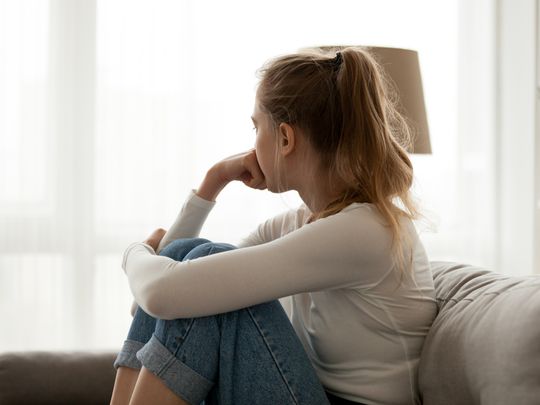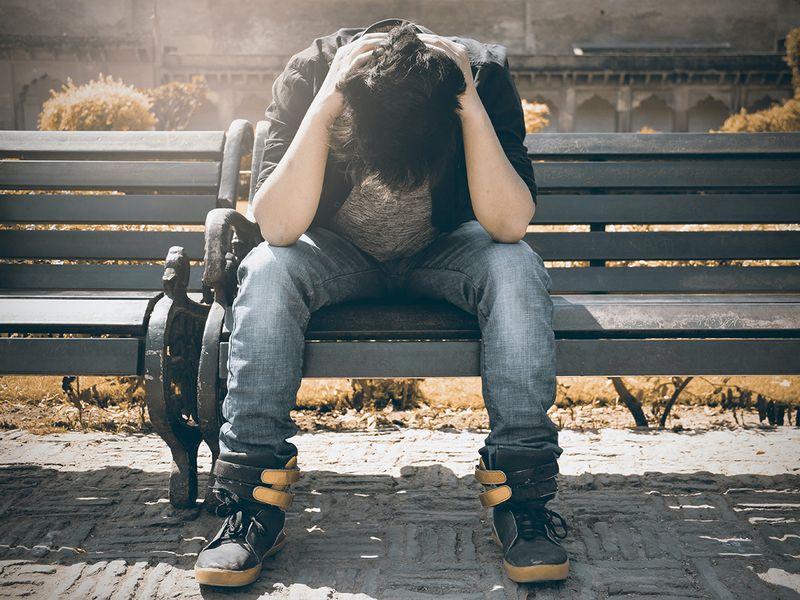
Dubai: Sitting all by yourself in the evening, having a cup of tea. That’s when it really hits you – the loneliness. For 75-year-old former Dubai resident H.S., loneliness is a constant companion in the later part of life.
“It hits my wife harder,” he said, referring to his spouse of 46 years.
With most of their children and grandchildren having migrated to different parts of the world, the empty-nesters have tried to make changes to address the challenge of loneliness.
“You have to keep yourself busy. If you have a hobby, pick it up. Also, exercise is important, not just for your health, but for social interactions as well – you end up talking to people at the park and making friends,” he said.
But the most effective way to combat the constant spectre of loneliness, according to him, is family.
“Even if you can’t visit them, call them, talk to them on a video call. Stay in touch. It really makes a big difference.”
How loneliness hurts you physically
A 2013 UK study also concluded that visits from the family were one of the most beneficial ways to combat loneliness and its detrimental effects.
Surveying over 450,000 adults, with a mean age of 56.5 years, the study found that individuals who were never visited by friends or family were at a 39 per cent associated increased risk of death.
On the other hand, participants who received a visit from a friend or family member at least once a month had a significantly lower associated increased mortality risk, suggesting that there was potentially a protective effect from this social interaction, the US-based science website neurosciencenews.com stated.

But the negative effects of loneliness are not limited to people in the older age group.
A 2013 study in the US found that loneliness has a direct relationship with cardiovascular health risk in young adulthood. It concluded that the greater the number of occasions on which participants were lonely - i.e. childhood, adolescence, and at 26 years of age - the greater their number of cardiovascular health risks. This includes impact on your blood pressure, cholesterol, and even the oxygen consumption in your blood.
The study, which was published in the US’ National Centre for Biotechnology Information (NCBI), also found that loneliness was associated with increased systolic blood pressure in a population-based sample of middle-aged adults.
“A growing body of longitudinal research indicates that loneliness predicts increased morbidity and mortality,” it stated.
So, not only does loneliness damage our mind and body, it can literally increase our chances of dying.
Yet, we seem to be living in an epidemic of loneliness, despite – or may be because of – a world dominated by social media .
A growing body of longitudinal research indicates that loneliness predicts increased morbidity and mortality.
All the lonely people, scrolling on their phones

Instagram, one of the most popular social media platforms in the world, has over nine million posts with the hashtag ‘#lonely’.
But, when you type the word into the search bar on Instagram, these posts aren’t what you see first.
Instead, you see a message: “Help is available.”
The app asks you if you want to ‘contact a helpline’ or ‘reach out’ to a person on your friends’ list.
According to Dr Diana Maatouk, a Dubai-based clinical psychologist, despite the apparent connectivity, social media and messaging apps can foster a sense of isolation.
Speaking to Gulf News, she said: “In today's world, where virtual interactions often take precedence over face-to-face communication, people find themselves grappling with unintended excessive screen time. It has emerged as a significant contributor to mental health challenges, particularly resulting from a painful feeling of loneliness and isolation. The nature of online interactions can lead to superficial connections, leaving individuals yearning for the depth and authenticity that real-world relationships offer.”
She added that studies have found that if you are spending hours every day using social media mainly as a substitute for real connection, your feelings of loneliness and inadequacy will likely worsen.
“Physical isolation is a direct consequence [of increasing use of social media] as people retreat into the virtual world. The decline in face-to-face interactions hampers the development of genuine connections, essential for emotional wellbeing. Moreover, the constant exposure to others’ seemingly ‘perfect’ lives on social media can fuel social comparison, contributing to feelings of inadequacy and isolation, creating a perpetual cycle of isolation and loneliness,” she added.
There is nothing better than an actual in-person engagement with a friend, said the mental health expert.
“When you’re face to face, you can read body language, emotions and energy better, which means more empathy and less comparison.”

Physical isolation is a direct consequence [of increasing use of social media] as people retreat into the virtual world. The decline in face-to-face interactions hampers the development of genuine connections, essential for emotional wellbeing.
A downward spiral
“Physical isolation can have negative effects on mental and physical health, including increased risk of depression, anxiety, and other health issues,” added Dr Sarah Halawani Montes, a counseling psychologist based in Dubai, who also highlighted the need to understand the difference between loneliness and social isolation.
“While loneliness is the distressing feeling of being alone or separated, social isolation is the lack of social contacts and having few people to interact with regularly,” Dr Montes said. One leads to other.
“Physical isolation can have negative effects on mental and physical health, including increased risk of depression, anxiety, and other health issues,” she added.
Dr Maatouk also spoke about how isolation – apart from damaging a person’s physical and mental health – can also push people towards unhealthy habits.

Physical isolation can have negative effects on mental and physical health, including increased risk of depression, anxiety, and other health issues.
“Individuals experiencing social isolation are more prone to engaging in unhealthy behaviours such as smoking, for example, as a way to tackle boredom. This unhealthy cycle tends to exacerbate their condition,” she said.
“Online platforms can cause social isolation and loneliness when one relies on them in a disproportionate way as the main way to connect with others, posing the challenge of discerning when virtual relationships are beneficial (when used in moderation) and when their excessive use prevents someone from experiencing the unique benefits of in-person interactions,” Dr Maatouk added.
• Social isolation significantly increased a person’s risk of premature death from all causes, a risk that may rival those of smoking, obesity, and physical inactivity.
• Social isolation was associated with about a 50 per cent increased risk of dementia.
• Poor social relationships (characterised by social isolation or loneliness) were associated with a 29 per cent increased risk of heart disease and a 32 per cent increased risk of stroke.
• Loneliness was associated with higher rates of depression, anxiety and suicide.
• Loneliness among heart failure patients was associated with a nearly four times increased risk of death, 68 per cent increased risk of hospitalisation, and 57 per cent increased risk of emergency department visits.
(Source: US Center for Disease Control and Prevention)
It is important to create a balance between digital engagement and real-world interactions. Mental health experts recommend setting boundaries and establishing healthy screen habits. This can include scheduling regular breaks from screens, exploring hobbies, joining clubs or groups, and participating in community events that foster meaningful connections.
This epidemic of loneliness stemming from social isolation seems to be impacting Gen Z, too
“I don’t really make eye contact with people, and sometimes I try to cut the conversation short just to finish it off,” said Amal Al Jawini, a master’s student in the UAE.
While this does sound like an extreme case, unfortunately, it’s quite common. A 2021 study conducted by OnePoll - an international market research agency - revealed that 68 per cent of Gen Z admit they actively avoid face-to-face interactions if they can, especially if it’s strangers or work colleagues.
I don’t really make eye contact with people, and sometimes I try to cut the conversation short just to finish it off.
For Amal, the cause of poor communication skills, is her phone.
“Even though phones are convenient, because you can reach out to more people or even strangers on social media, I don’t have a personal connection. The more I’m on my phone and constantly checking it, the less I talk to people.”
This year, America’s Surgeon General Vivek H. Murthy even declared that the US is going through an epidemic of loneliness. But based on studies, this epidemic does not seem to be limited to the US.
For Mary Thomas, a 24-year-old Indian expatriate in the UAE, loneliness is probably an intrinsic problem and it all comes down to a person’s character. While she is able to communicate with relative ease, she also tries to consider whether the person in front of her is happy to engage in a conversation.
“Depends on the person. Generally, if a person is open to having a conversation I can talk to them,” she said.
Thomas’s thoughts echo a study conducted in 2021 by Canada’s University of Western Ontario.
The study stated that increased phone usage does result in lonelier adults with poor communication skills but it also highlighted that loneliness is best predicted by personality factors such as neuroticism and an individual’s reluctance to openly express their emotions.
However, she agreed that hiding behind the screen does impact human relationships, which leads to loneliness.
“There is only so much connection a person can make through online platforms. For relationships to develop, I believe we need to spend quality time with people, face to face,” she said.
‘Too busy to talk’
Another Dubai resident and millennial, Vineet Sharma, added that young people may also struggle because of a dangerous combination of two things – being busy and then spending free time behind a screen.
“Spending time on your phone does impact communication. We aren’t really able to talk or open up properly with friends or family. That personal touch is missing but I also think not having enough time or work schedules also play a huge factor,” he said.
A 2022 research study from the Society Human Resources Management (SHRM) – the largest HR association in the world – also found that a higher percentage of Millennials and Gen Z reported feeling lonely compared to workers from older generations.
That personal touch is missing but I also think not having enough time or work schedules also play a huge factor.
Alex Mahon, the CEO of British television network Channel 4, even went so far as to say that young people can’t debate, and lack commitment because they are trapped in echo chambers created on TikTok and Instagram. Her remarks were made at the Royal Television Society's Cambridge Convention in September this year.
Gen Z – a future riddled with anxiety and stress
According to Amal Al Jawhini, too, the challenge of loneliness is not one she alone faces.
“When I look at my friends’ group, a lot of us have anxiety and stress and that really affects our daily lives,” she said.
A staggering statistic revealed by the American Psychological Association revealed that 91 per cent of Gen Z have experienced at least one physical or emotional symptom because of stress, such as feeling depressed, sad or lacking interest, motivation or energy.
However, on a brighter note, the same study stated that Gen Z is probably more likely to recognise these issues and seek help.
According to Al Jawhini, her phone is taking away the time with people who are physically present in her life.
“You realise you wasted your time and you could have interacted with your family and friends. But instead, you are avoiding everyone, probably lying in bed, and it’s not even good for your body and brain,” she said.
In 2023, a series of TikToks with the hashtag ‘bed rotting’ started popping up. This trend was created by Gen Z and it promotes lying in bed all day, eating snacks, watching Netflix and doing nothing.
From the outside, it looks like Gen Z is slowly embracing the lifestyle of a hermit, but this is all under the guise of self-care.
“When you are doing this, it is quite entertaining, but once you are off your phone, reality kicks in,” she said.
First person account
All the single ladies … and men – a personal account of being single and dealing with social isolation
By Surabhi Vasundharadevi, Social Media Reporter
I remember the day when I left my home country to embrace a new chapter of my life in Dubai. I was 32 years old and had just received a great job offer. Moving to this city meant stepping into a world of independence.
Known in my circle as a social butterfly, I was excited to explore a new culture, meet new people, and create a thriving social life. However, soon after I arrived, I realised that nothing could replace the warmth of familiar faces.
I felt lonely.
Having left family and friends behind, I soon discovered that the distance made my mobile phone my lifeline, connecting me to loved ones.
Little did I know that the world was about to change drastically. Just a month after I joined office, COVID-19 swept across the globe, pushing everyone to work from home. Social distancing became the norm and public places were shut down. My chances of making new friends faded.
The pandemic made me more dependent on the digital world than ever before. I tried to adapt to my new routine but felt confined within the four walls of my home – it was claustrophobic.
The pandemic forced me to put my plans for an active social life in Dubai on hold. My phone became a portal to both work and leisure, blurring the lines between professional and personal life. The isolation took its toll, and the phone became a source of comfort.
As an individual in a new country during a global crisis, I had to face several challenges, most of which were emotional. However, I had to learn to calm myself down. I tried listening to music, which, to a great extent, helped me overcome my anxiety due to loneliness. Every time I felt stressed, I would call my mum, just because I needed to talk to someone. Realising that it had reached a point where I was disturbing her, I tried to find other sources of mindful distractions. I started cooking and turned to Netflix on the weekends.
Nevertheless, this experience became a unique journey that tested my resilience and adaptability. Despite the uncertainty and fear surrounding me, I was determined to overcome the obstacles and make the most of my situation. With each passing day, I learned to be patient so I wouldn't lose my sanity. I found that self-talk was extremely helpful. Instead of panicking and reacting impulsively to situations, I tried to calmly assess and understand it. As a result, I was able to create a sense of comfort and stability for myself. I began to appreciate my own company and found enjoyment in simple activities such as preparing meals and watching classic movies.
Looking back, I am proud of how far I have come, and I know this experience has made me stronger and more capable.
At first, my phone was just a way to stay connected, but now it has become a lifeline that lets me work from anywhere and feel connected to the world around me. I feel like I have become more dependent on my phone than ever before. It has become a habit for me to constantly scroll through my phone, whether it's for online shopping or browsing through Instagram reels.
Although I am now married, I can't help but notice that over time, the quality of our interaction has changed. While earlier we would have face-to-face interactions, nowadays, we always have our phones in hand, even when we are talking. Our conversations have not diminished in frequency, but I can sense a subtle change in our interaction. Sometimes, this lack of quality interaction still makes me feel isolated at times. I can't help but wonder if others feel the same way. It seems like sharing Instagram reels and scrolling through social media feeds have taken over our once meaningful exchanges. It's like we're still talking, but our attention is divided between the virtual world and the real one. It makes me wonder, have we become so gripped in our digital lives that we're losing touch with people around us?
Share your views and experiences on the issue at readers@gulfnews.com









